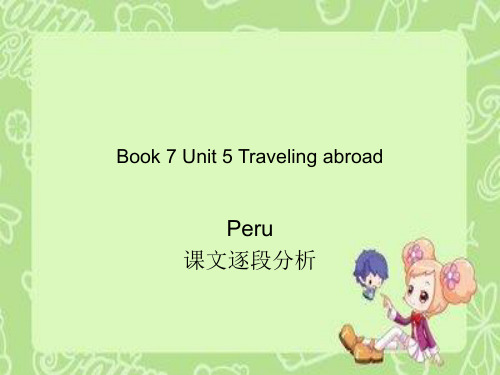高中英语选修7第五单元的中心话题是出国旅游,课文
- 格式:doc
- 大小:33.50 KB
- 文档页数:10



Unit 5Travelling abroad教材分析和教材重组本单元的中心话题是“出国旅游”,课文始终围绕这一主题展开。
旨在通过单元教学,使学生了解在国外旅行或学习时可能会遇到的一些问题,并学会怎样去解决问题。
要求学生学会表达和支持个人观点,能用所学的有关出国旅游的词汇描述在国外居住生活的情况,在国外旅游时能根据所给的信息选择恰当的旅游线路。
语法方面要求学生会正确使用非限制性定语从句。
课时一:Warming Up and Reading Task“热身”(Warming Up)部分设计了四个讨论题目,帮助学生在大脑中形成有关国外旅游的信息,让学生讨论在国外旅行会遇到什么问题,并且讨论该如何来解决这些问题。
这样就自然过渡到Reading Task (Page 82)——四个年轻人在国外旅游遇到问题的经历。
课时二:Reading“读前”(Pre-reading)部分设计了两个问题,第一个问题要求采用与同学讨论交流的方式谈论在国外学习的利与弊,激发同学们的学习兴趣;第二个问题要求学生预测阅读课文中的主人公在英国学习可能遇到的困难和英国学校学习与中国学校学习的不同。
“阅读”(Reading)部分介绍了主人公谢蕾第一次去国外求学进预科班时所面临的问题,以及房东和导师对她的帮助,要求学生明白国外学习的利与弊,培养正视困难、迎接挑战的信心。
课时三:Grammar (语法复习课)本单元的语法重点是复习非限制性定语从句(Non-restrictive Attributive Clause)。
学生已经学过这个语法点,所以在这节课中,首先对非限制性定语从句的特征、关系词做一个简要回顾,然后通过多种形式的练习,如填写关系词、造句和改错等,使学生逐步掌握非限制性定语从句的用法。
这些教学环节,如开始部分的欣赏范文、找出好句的活动和结束部分的写作练习,都充分体现了在语境中学习语法、在语境中运用语法的教学原则。
课时四:Listening(听力课)这节听力课把Using Language中的Listening和Workbook中的Listening Task整合到一起,训练学生在听力前预测及在听的过程中注意细节信息的能力。









高中英语学习材料madeofjingetiejiUnit Five Travelling abroad课程标准中的内容标准:本单元的中心话题是“出国学习或旅游”,课文始终围绕这一主题展开。
语言知识和语言技能部分主要是围绕着一中心话题进行设计的。
教学细目:1.(情感目标)帮助学生树立国际意识,培养学生跨文化交际能力。
2.(情感目标)培养学生坚强的意志,鉴定克服困难,迎接挑战的决心。
3.(语法)掌握本单元教学目的和要求中的词汇用法。
4.(写作)学会在写作中使用“比较(comparison)”和“举例(example)”的写作技巧。
5.(语法)复习非限制性定语从句,进一步明确限制性定语从句与非限制性定语从句的区别。
学习领域与主题内容及要求目标层次人教版选修七UnitFiveTravellingabroad理解掌握运用1.1.1. 话题:national consciousness andinternational awareness; studying abroad;travelling abroad√1.1.2功能:1. likes and dislikes 喜好和厌恶I like/don’t like doing/to do…I prefer to…I enjoy/love/hate doing…2. probability and improbability可能与不可能We could/might…√It would be possible to…You might…It’s a possibility.It’s likely/unlikely that…It’s not very likely…He/She/They will probably……would probably suit us.It is impossible to…I don’t think you’d enjoy…It’s (very) possible that…It could happen.I doublt it.It’s out of the question.Probably…Most robably…√1.1.3 Understanding vocabulary(理解词汇)(学生只需认识,不作为测试的内容考查)cafeteria, lecture, numb, seminar,Rugby, oilfield, inn, revise, site, geographical, onwards, hike1.1.4 Grasping vocabulary(掌握词汇)√(学生能够掌握其意义、用法、搭配,可作为考查内容)Motherland, visa, queue, qualification,preparation, shopkeeper, idiom, academic,requirement, essay, tutor, autonomous,enterprise, apology, videophone, bachelor,routine, minibus, optional, cage, bark,battery, drill, agent, parallel, destination,tomb1.1.5 Applying vocabulary(应用词汇)√(学生在写作中能够运用下列词汇)adjust to, keep it up, fit in, recommend,comfort, substitute, draft, acknowledge, asfar as one is concerned, contradict, occupy,be occupied with, day in and day out,abundant, govern, out of the question,settle in.1.1.6语法:复习非限制性定语从句√√revise the non-restrictive clauseXie Lei, who is 21 years old, has come toour university to study for a businessqualification.“It’s not just study tha t’s difficult…,”explained Xie Lei, who had lived all herlife in the same city in China.Living with host families, in which theremay be other college students, gives herthe chance to learn more about the newculture.√√1.1.7句型结构:It is not just study that’s difficult.Youhave to get used to a whole new way oflife, which can take up all yourconcentration in the beginning.Although some foreign students live instudent accommodation or apartments,some choose to board with Englishfamilies.I have been so occupied with work that Ihaven’t had time for social activities.Part One重点知识点I. 重点单词和词组P. 37Words: customPhrases: adjust toP. 38Words: lecture, qualification, preparation, recommend, accommodation, idiom, comfort, acknowledge, contradict, lack, substitute, requirements Phrases: board a plane, dream of, for so long, what to expect, in a queue, take up your concentration, hand in, as far as he was concernedP. 39Words: autonomous, enterprisePhrases: be occupied with, a list of,P. 40Words: apology, seminar, bachelor, optionalPhrases: day in and day out, fit inP. 41Words: bark, drill,P. 42Words: agentP. 43Words: gain, independence,Phrases: run parallel to, be abundant in/with, be governed by, out of the questionP. 44Words: diverse,Phrases: in time,P. 42Phrases: settle inII. 重点句型见表1.1.7III. 重点语法复习非限制性定语从句:能理解非限制性定语从句的意义和功能,能正确区分限制性定语从句和非限制性定语从句的区别,从而正确使用非限制性定语从句。


Unit5 Travelling abroadReading and speaking的说课稿一、说教学背景1. 教材分析(1)本单元以travelling abroad为话题,包括两篇阅读,它们分别以“出国学习”和“出国旅游”为话题。
旨在通过单元教学,使学生了解在国外旅行或学习时可能会遇到的一些问题,并学会怎样去解决问题和避免这样问题的发生。
学会表达和支持个人观点,能用所学的有关travelling abroad的词汇描述在国外居住生活的情况,在国外旅游时能根据所给的信息选择恰当的旅游线路。
本单元的整体框架为:WARMING UP;READING;LEARNING ABOUT LANGUAGE三大部分。
USING LANGUAGE中的第一课时Listening第二课时Reading and speaking。
第一课时Listening让学生了解有关Peru这个国家的一些情况,为下面的reading and speaking 作铺垫。
(2)教材的重组USING LANGUAGE中的Listening与Reading and speaking都是谈论有关秘鲁这国家,介绍秘鲁的景色以及在秘鲁旅行的几条路线,内容一致,所以放在一起,设计成"听说课"。
今天说课的内容是第二课时Reading and speaking阅读部分主要依据地图对秘鲁这个国家进行介绍,要求学生skim(to get the main idea),再scan( to get the details), 然后回答3个Wh-问题。
文章还提供了一个旅游小册子,其内容包括在秘鲁旅游的四条路线。
要求学生在读后根据文章细节回答四个问题。
Speaking部分主要是设置了一个情景your group plans to spend eight days in and around Cuzco。
要求学生依据所提供的旅游手册来选择适合自己团队的旅游路线。



高中英语选修7第五单元的中心话题是出国旅游,课文一教材分析:高中英语选修7第五单元的中心话题是“出国旅游”,课文始终围绕这一主题展开。
具体涉及国外学习、旅游等,语言知识和语言技能部分主要是围绕“旅游”这一中心话题进行设计的。
这一节课是本单元的第一篇阅读训练课,标题是KEEP IT UP,XIE LEI Chinese student fitting in well(谢蕾,再接再厉~中国学生适应能力强),讲的是21岁的中国小姑娘——谢蕾出国上学的经历,具体描写了她出国前的不安和到了国外后的不适应,主要是生活上的不习惯及学习方法、思维方式的冲突。
但经过她的努力,她克服了这一切,并开始了崭新的生活。
通过本单元的学习,既要让学生通过语言实践活动来体验语言,提升综合语言运用的能力,又要增强学生挑战新生活的信心,感受到“出国旅游”的气息。
二、学情分析一方面,高中年龄段的学生对周围的事物较为敏感,有自己的观点和看法,他们不满足于教科书上的知识,,想获得更多的信息。
在英语学习上,他们不只是想把英语作为一门死记硬背的课程来学,更希望能学到知识性和趣味性兼有的内容,从英语学习中获得更多的知识和能力。
另一方面学生对出国学习比较感兴趣,对国外的生活有一定的了解,因此,应结合学生的实际情况,因材施教,激发学生兴趣,让学生主动学习,学有所获。
三、教学目标及教学过程Teaching goals教学目标1. Target language目标语言a. 重点词汇和短语keep it up, fit in, cafeteria, lecture, qualification, preparation, recommend, get use to, shopkeeper, comfort, substitute, academic, requirement, essay, tutor, numb, acknowledge, asfar as one is concerned, occupy, hopefully, enterprise, succeedb. 重点句子Xie Lei, who is 21 years old, has come to our university to study for a business qualification.It’s not just study that’s difficult. You have to get used to a whole new way of life, which can take up all your concentration in the beginning.I have been so occupied with work that I haven’t had time for social activities.I’m going to join a few clubs. Hopefully I’ll make som e new friends.2. Ability goals能力目标Enable the students to learn about Xie Lei’s school life inLondon.3. Learning ability goals 学能目标Help the students learn how to deal with the problems that they would face when studying in a foreign country.Teaching important and difficult points 教学重难点Help the students to summarize the benefits and difficulties of living in a foreign country.Teaching methods 教学方法Skimming, scanning, task-based method anddiscussion.Teaching aids 教具准备A recorder, a projector and some slides.Teaching procedures && ways教学过程与方式Step ? Read all the words and expressions in unit 5Step ? Pre-readingTalk about studying in a foreign country. First present two piecesof news to start the topic.Show the news on the screen.NEWS 1On Dec 6th 2005, two Chinese overseas studentswere killed inOttawa,Canada. They were shot at a bar, one was shot dead at once, the other died during the way to the hospital. It was said that the murderer were Vietnamese.NEWS 2(Xinhua News Agency) A car accident happened to a group of Chinese overseas students inNewZealandon Sep 7th 2005.New Zealandpolice said that the car accident happened in the early morning, one student, Xiao Ding, died on the spot, the other four students were hurt. Now two of them are still in hospital.T: I read the two pieces of news recently. Whatcan you learn from the news?S: We can get the information that we may meet some securityproblems while studying in a foreign country.T: Yes. As we know, now more and more people live or study abroad, even some senior or juniorhigh school students are sent to study abroad. Doyou know why?S: I think they want to learn more advanced technology, know more different cultures and customs; they want to enlarge their knowledge and improve their ability.T: Besides the security problems, what are otherproblems that they might meet in their study and daily life? Today let’s learn a text about a Chinese girl studying inLondon. First,please turn to Page 37, look at the pictures and discuss the questions above them.After discussion.T: Now who’d like to answer the first question? Volunteer!S: Let me try. The advantages of studying in a foreign country are that we could learn standard English, we can communicate with the local people, and we could know the manners and customs of the country better.T: Quite right.S: But there are still many disadvantages of studying in a foreign country. It would be difficultfor us to communicate with the local people, and we should adapt to the situation quickly, we can’t understand the language very well, so it’sdifficult for us to do many things even some simple things. What’s more, we will miss our homes, miss our parents and friends.T: Yes, so many difficulties to deal with. Then what do you think a Chinese student will find different from studying at a Chinese school?S: They will find it’s not easy to study in a foreign country. Different teaching method, different learning method and different education system, they should adapt to all these things quickly.Step ? While-readingGet the students to comprehend the passagequickly and accurately, meanwhile help the students to form a good habit of reading.T: Now please skim the passage fast to obtain a general understanding of the whole passage. While reading, try to find out the main idea of eachparagraph.Several minutes later, ask the students to talk about the main idea of each paragraph. At the same time, show the suggested main ideas on the screen.Main idea of each paragraph:Para.1: Xie Lei, a Chinese girl, is studying in a foreign country —London.Para.2: General introduction to Xie Lei and her study.Para.3: The difficulties Xie Lei met while living inLondon.Para.4: The advantages of living with a host family.Para.5: Xie Lei is getting used to theWestern University’s way of learning.Para.6: Xie Lei feels much more at home inEnglandnow and is living an active life.Para.7: The newspaper will follow Xie Lei’s progress in later editions.T: Well done. Now please read the text carefully to have a better understanding of the text. Then we will look at some detailed information of the text. Studying inLondon, Xie Lei has to face some difficulties. While on the other hand, she also gets some benefits. Try to find the difficulties and benefits from the text and fill in the diagram on Page 39.To finish this task, the students need to scan the text and make a summary. After they have finished it, check the answers by asking some students to tell what they have written.T: Who would like to tell your answers?S: I would like to say something about thebenefits. The benefit of doing a preparation course is helping her to get used to academic requirements of aWesternUniversity.S: I think that the benefit of living with a host family is that she can get lots of advice; she has the opportunity to learn more about everydaylife and customs of the new country. Living with a host family is a great comfort when she misses her family.S: And I think the benefit of having a tutor is getting some good advice on study and he or she can coach you with your article; you can make greatprogress with the help of a tutor.T: Very good! Then, what about the difficulties?S: The difficulties that Xie Lei met at the University were that when she heard an expression, she couldn’t understand. It seems strange to her that someone does something. She didn’t know how to write a good essay on her own.S: In order to get used to a new way of life, she had to learnalmost everything again. For example, how to use the phone, how to pay on the bus, how to ask a shopkeeper for things she didn’t know the English for. She didn’t understand the words that thelocal people say. She hasn’t had time for social activities.Step ? Post-readingLet the students listen to the tape and at the same time, do the exercises about comprehending.1. What’s the main idea of thetext?A. Xie Lei’s social life inChina.B. Xie Lei’s study and life inLondon.C. Xie Lei’s working inNew York.D. Xie L ei’s life with a Friend family.2. Which is right about the preparation course?A. She finds it very important to learn.B. Most foreign students don’t finish it before entering a degree course.C. She finishes it two years later.D. She doesn’t think well of it.3. What does “It’s not just study that’s difficult.” Mean.A. Xie Lei thinks it’s not difficult to study.B. Xie Lei thinks something else is also difficult to do as well as studying.C. She needn’t have to learn almost everything again.D. Beginning a new way of life inEnglandis easy for her.4. How does Xie Lei live while she is studying abroad?A. She lives in a Chinese family.B. She lives in a local family with other students.C. She stays in a hotel alone.D. She lives in the school with her classmates.5. We can know ___________.A. she doesn’t miss her parentsB. she has never copied other’s essaysC. her tutor has accepted her first essaysD. she feels as if she is living at homeStep ? SummaryXie Lei , a 21 –year-old girl, is studyingin our university for business __1____. She said that it’s not just study that’s difficult. In fact, in the beginning the thing that took ___2____ all her concentration is to get used to the whole new way of life. She had to learn almost ___3___ again. Xie Lei lives with a host family and can get help from the family members. Meanwhile, when she misses her family, it’s a great ____4___ to have a substitute family to be with. The course she is taking will help her get used to the academic _____5__ of a Western university. Once Xie Lei used the information in an article on the Internet without _____6__ the author. As ___7_ as her tutorwas concerned, the most important thing ____8_ Xie Lei thought. He even encouraged her to _____9_ theaut hors she’s read. Now Xie Lei feels much __10__ home inEngland, and will lead a more active and happier life in the future.Step VI HomeworkHomework: A composition With the development of society, people are getting much richer than before. More and morep arents plan to send their children to study abroad. What’s your opinion, are you For or Against it? And Why? (at least 100 words 、课后反思成功之处: 1、让学生明确学习目标,站在学生角度,精心设计活动。